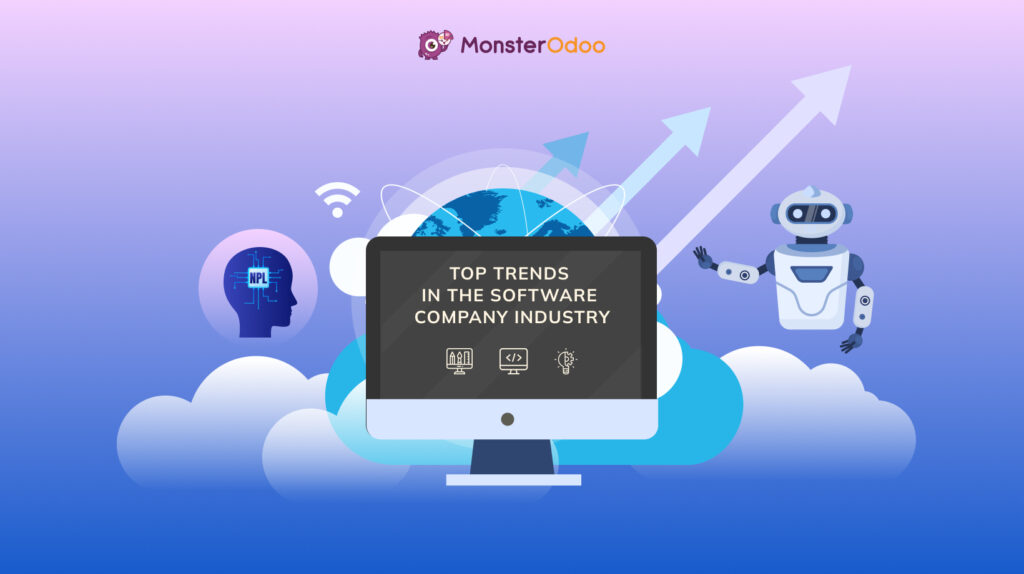The software company industry is rapidly evolving, driven by technological advancements and changing market demands. Staying updated with the latest trends is crucial for software companies to remain competitive and deliver cutting-edge solutions. In this blog post, we will explore the top trends shaping the software company industry. From artificial intelligence and machine learning to cloud computing and user experience design, these trends are revolutionizing how software companies operate and deliver value to their clients.

Trend Artificial Intelligence and Machine Learning
Artificial Intelligence (AI) and Machine Learning (ML) are revolutionizing the software company industry. Here’s how they’re transforming software development:
- Automation and Efficiency: AI and ML automate repetitive tasks, streamline processes, and accelerate development cycles.
- Personalization: AI and ML analyze user behavior to deliver personalized experiences, recommendations, and content.
- Chatbots and Virtual Assistants: AI-powered chatbots provide real-time assistance and improve customer support.
- Predictive Analytics: AI and ML extract insights from data, enabling businesses to make data-driven decisions and offer predictive solutions.
- Natural Language Processing: NLP enables software applications to understand and interpret human language, enhancing communication and multilingual capabilities.
- Enhanced Security: AI and ML help in detecting anomalies, identifying cyber threats, and strengthening security measures.
By leveraging AI and ML, software companies can deliver intelligent, efficient, and personalized solutions that meet evolving needs and gain a competitive edge.
Trend in the Software Company Industry: Cloud Computing and SaaS Solutions
Cloud computing has revolutionized the software industry, offering scalability, flexibility, and cost-effectiveness. Software-as-a-Service (SaaS) solutions, hosted in the cloud, have gained popularity for their accessibility and ease of use. Businesses are increasingly adopting cloud-based software to leverage its benefits, such as reduced infrastructure costs, automatic updates, and remote collaboration. Software companies are embracing cloud computing to deliver innovative and scalable solutions that meet the evolving needs of businesses.
Trend DevOps and Continuous Integration/Continuous Delivery (CI/CD)
DevOps practices and CI/CD methodologies have transformed software development and deployment processes. DevOps emphasizes collaboration, communication, and automation between development and operations teams, leading to faster delivery of high-quality software. CI/CD pipelines enable continuous integration of code changes, automated testing, and seamless deployment, resulting in faster time-to-market and improved software quality. Software companies adopting DevOps and CI/CD practices gain a competitive advantage by delivering software updates more frequently and efficiently.
Trend User Experience (UX) Design and Customer-Centric Approach
User Experience (UX) design has become a critical factor in software success. Software companies are prioritizing intuitive and user-friendly interfaces to enhance customer satisfaction. By understanding user needs and preferences, software companies can create engaging experiences that improve productivity and user adoption. A customer-centric approach focuses on gathering user feedback, conducting usability tests, and iterating on designs to ensure software solutions meet user expectations. By embracing UX design and a customer-centric approach, software companies can differentiate themselves and build long-lasting customer relationships.
Trend in the Software Company Industry: Internet of Things (IoT) Integration
The Internet of Things (IoT) is revolutionizing software development through device connectivity and data exchange. Here’s how IoT integration is transforming the industry:
- Connectivity: IoT connects devices, enabling data collection and real-time monitoring.
- Industry-specific Applications: IoT enables software companies to develop applications tailored to specific industries, such as healthcare and manufacturing.
- Smart Homes: IoT integration allows homeowners to control and automate various aspects of their homes for enhanced convenience and energy efficiency.
- Edge Computing: IoT data processing at the edge of the network reduces latency and improves system performance.
- Analytics and Insights: IoT-generated data provides valuable insights for data-driven decisions and personalized experiences.
- Challenges: IoT integration requires addressing data security, privacy, and interoperability challenges.
By embracing IoT integration, software companies can deliver innovative solutions and drive digital transformation.
Conclusion:
In conclusion, the software company industry is experiencing significant transformations driven by various trends. Artificial Intelligence and Machine Learning are revolutionizing software development through automation, personalization, and predictive analytics. Internet of Things (IoT) integration is enabling device connectivity, data exchange, and industry-specific applications. Additionally, User Experience (UX) design and a customer-centric approach are becoming crucial for software companies to deliver exceptional products and services.
The future of the software company industry holds immense potential for innovation and growth. As technology continues to advance, software companies must stay agile, embrace emerging trends, and prioritize customer needs to remain competitive in this ever-evolving landscape.
One notable software solution provider in this industry is MonsterOdoo, offering Odoo ERP software, comprehensive solutions for streamlining business operations. To leverage the power of these technologies and enhance productivity, efficiency, and customer satisfaction, consider contacting MonsterOdoo today.



